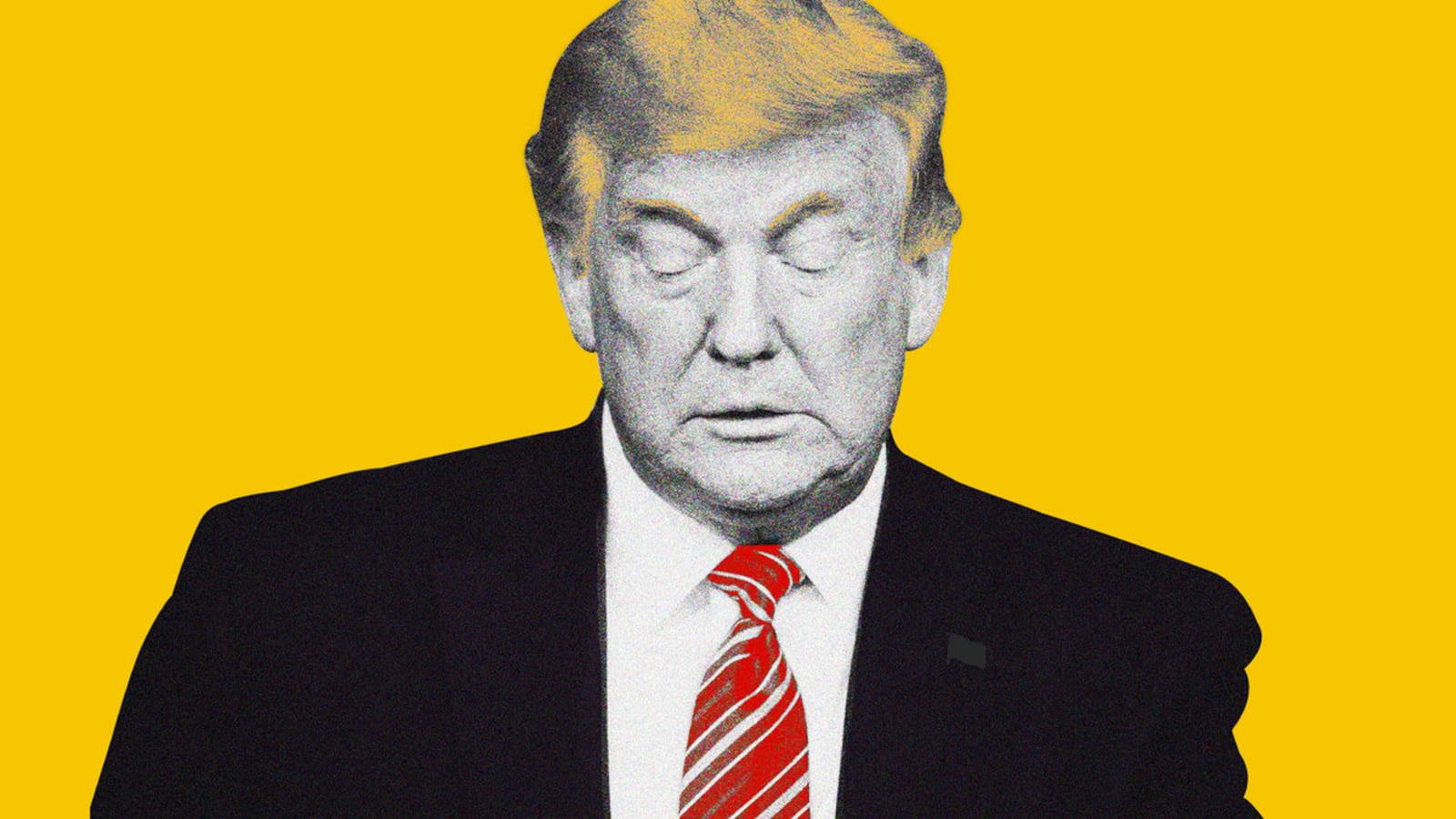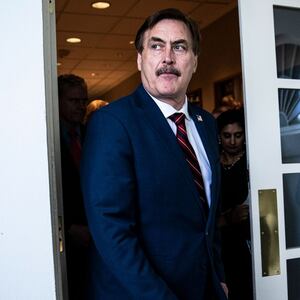A criminal investigation in the state of Georgia. The expansion of a New York-based probe into Donald Trump’s business empire. Lawsuits brought by women who allege Trump assaulted them. Billion-dollar defamation suits launched against people acting on Trump’s demands. Angry enemies and former friends who see fresh legal vulnerability. And continued litigation and possible charges stemming from the deadly MAGA riot at the U.S. Capitol.
Following last week’s speedy acquittal in former President Trump’s second Senate impeachment trial, Trump, his advisers, and his lawyers spent part of the long weekend celebrating his insulation from yet another legal hassle.
But with the Senate trial in the rearview, Trump is now confronting a whole range of other legal dramas during his immediate post-presidency. No longer shielded by the considerable legal protection of the Oval Office, Trump has privately bemoaned that his foes are going to be investigating or “suing me for the rest of my life,” according to one person who’s discussed the matter with him in the past few weeks.
The new lawsuits dealing mainly with his attempts to overturn the results of the election seem to grow weekly.
On Tuesday, a new federal lawsuit was filed by the NAACP on behalf of Rep. Bennie Thompson, a Mississippi Democrat. The suit, which was also filed against Trump attorney Rudy Giuliani, the Oath Keepers, and the Proud Boys, alleges that both men and the two groups violated the 1871 Ku Klux Klan Act when they attempted to halt the certification of Joe Biden’s 2020 win.
“The lawsuit alleges that Trump and Giuliani violated... the Ku Klux Klan Act, which was passed in 1871 in response to KKK violence and intimidation preventing Members of Congress in the South during Reconstruction from carrying out their constitutional duties,” a press release announcing the lawsuit said. “The statute was intended specifically to protect against conspiracies.”
Multiple Trump and Giuliani advisers did not respond to inquiries regarding which attorneys would be handling this federal suit for their respective clients—though Michael van der Veen, one of the Trump lawyers in this month’s Senate trial, and Alan Dershowitz, the celebrity lawyer who joined Trump’s legal defense for the first impeachment trial, both told The Daily Beast they had not been contacted by the Trump orbit on these matters as of Tuesday.
The federal suit comes just as attorneys working in the D.C. attorney general’s office were still debating whether to charge the former president for violating local law when he allegedly incited the rioting, according to CNN.
Though the riot was the culmination of Trump’s months of ham-fisted attempts to overturn the 2020 election, it’s hardly the only chapter in Trump and his allies’ efforts that has potentially left the ex-president legally exposed.
On Feb. 10, prosecutors in Georgia embarked on a criminal probe into Trump’s conference call in early January (prior to the riot), during which the then-president pressured state officials to “find” the votes necessary to undo Joe Biden’s 2020 victory in that state. The phone call was just one facet, surreptitiously caught on tape, of Trump and prominent Republicans’ months-long legal and messaging crusade to throw out Biden’s clear and legitimate wins in several crucial states. Trump’s failed mission grew increasingly authoritarian as the presidential transition went on, but virtually all of the legal challenges got tossed or laughed out of court, including by Trump-appointed judges. The Georgia secretary of state’s office has also opened its own separate investigation into the now-infamous call, characterizing the probe as “fact finding and administrative.”
“The timing here is not accidental given [the] impeachment trial,” Jason Miller, senior adviser to Trump, said in a brief statement to The Daily Beast, referring to the Georgia criminal investigation. “This is simply the Democrats’ latest attempt to score political points by continuing their witch hunt against President Trump, and everybody sees through it.”
But the legal exposure could extend beyond political affiliations, as the voting tech companies that Trump and top allies had baselessly smeared as part of a fictitious conspiracy to rig or hack the election and tip it to Biden have already sent numerous legal threats to individuals close to the former president.
Smartmatic and Dominion Voting Systems have already lodged mammoth lawsuits against Giuliani, former Trump attorney Sidney Powell, and others. Giuliani, who has served as Trump’s personal lawyer, and Powell were pushing these fictitious conspiracy claims at the behest of Trump, who himself pushed such false allegations on Twitter and elsewhere. Those working on Team Dominion, for instance, have said that they are still taking a hard look at others involved in baselessly tarring the company—and that pool of people included, perhaps first and foremost, the 45th president of the United States. “Our legal team is looking at, frankly, everyone, and we're not ruling anybody out,” Dominion CEO John Poulos said in a CNN interview in late January.
The coming lawsuits against Trump in his post-presidency could also get personal, as well. Two days before Trump stepped out of office last month, MSNBC host Joe Scarborough publicly stated that he was still weighing a possible suit against Trump, who during his time in the White House had promoted—multiple times—the evidence-free smear that Scarborough is a murderer.
According to a person with knowledge of the matter, Scarborough has recently told people that he is still considering filing a lawsuit against the former president, but that he hasn’t made a final decision yet, and likely won’t for months. However, the MSNBC host has also said that if there ends up being a pile of civil lawsuits filed against Trump in the coming months, particularly over his role in starting the Jan. 6 riot, that would likely factor into his calculus not to bother with filing his own suit.
In recent months, this knowledgeable source added, Scarborough has discussed a potential suit against Trump with Washington, D.C.-area lawyer Elizabeth “Libby” Locke, of the noted Clare Locke firm.
In the weeks after Biden was sworn in, Trump had laid conspicuously low in public and media appearances. Many longtime allies of the former president believed it was for the best, and had advised Trump to keep doing so for the time being, especially if there’s a torrent of lawsuits getting filed. One source close to the ex-president said that they were “glad [Trump’s] not on Twitter anymore,” because if he were, his post-presidency rage-tweets could “inevitably” make potential court cases, particularly defamation ones, against him stronger.
But following the death of conservative radio host Rush Limbaugh on Wednesday, Trump couldn’t help himself. He called in to Fox News to speak about Limbaugh’s life and their friendship— and ended up trying to make it about himself and the lie that he had won the 2020 election. Shortly after, it was announced that Trump would appear on Hannity, Newsmax TV, and OAN, all also on Wednesday.
An individual familiar with the matter said that Trump had recently been reminded not to mention Dominion or Smartmatic during any new interviews, due to fears that that could be used against him if either company decides to go after him, as well, in defamation lawsuits.
Not all the former president’s litigation challenges are new, however. Others have sat dormant, waiting for him to return to civilian life.
His new status has also reawakened prosecutors in New York who, according to The Wall Street Journal, are now looking into loans that Trump took out on several buildings, including the staple of his sprawling family business: Trump Tower in Manhattan. The Trump Organization and the former president are still grappling with how to address the hundreds of millions of dollars in estimated debt that it’s taken on, with due dates for those loans set to arrive within just a few years.
In New York, both the Manhattan district attorney’s office and state Attorney General Letitia James are investigating whether the Trump Organization committed tax and insurance fraud by lying about the value of assets. The investigations spawned a separate court battle over District Attorney Cyrus Vance’s attempts to subpoena Trump’s tax returns. The case remains pending before the Supreme Court but Vance has reportedly already obtained many of the returns through other means, according to Bloomberg.
The power of the incumbency also afforded former President Trump the ability to dodge negative consequences for his alleged history of sexual violence and harassment. Another source close to Trump says that the ex-president continues to occasionally complain about the Me Too movement, decrying it as one of the more destructive movements to gain national traction during his one term in the White House.
A lawsuit filed by former journalist E. Jean Carroll claiming Trump defamed her by calling her a liar—after she accused Trump of raping her in a New York department store in the 1990s—is still pending. Under Attorney General Bill Barr, the Justice Department tried to remove the case from state court and place it in federal court where department lawyers would handle the case on Trump’s behalf.
Further, during the entirety of the Trump administration, Summer Zervos, once a contestant on Trump’s now-defunct NBC reality TV show The Apprentice, had been trying to depose Trump in a defamation lawsuit. Toward the end of the 2016 presidential election, Zervos publicly accused the then-Republican nominee of sexually assaulting her, grabbing her breasts, and “thrust[ing]” his “genitals” at her. While he was in office, the official position of the White House was that the many women who had gone on-record to accuse Trump of sexual misconduct or assault were simply lying.
Early last year, a court in New York paused the lawsuit, thus postponing any potential deposition of the then-sitting president of the United States. But last week, Zervos and her attorney formally asked a judge to allow her to continue with her suit, given that he can no longer claim protections of the highest office in the land that his lawyers had long said shielded him from this deposition.
“[The] Defendant now is no longer President. As a result, Defendant’s appeal is moot,” Zervos’ lawyer argued in the new filing.








